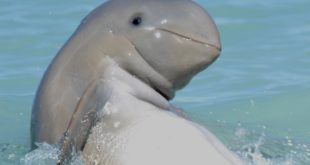Abrupt thawing of permafrost will double previous estimates of potential carbon emissions from permafrost thaw in the Arctic, and is already rapidly changing the landscape and ecology of the circumpolar north, a new CU Boulder-led study finds.
February, 2020
-
5 February
$1 million worth of shark fins seized at Miami port
U.S. government officials found 1,400 pounds of shark fins worth $1 million hidden in boxes in Miami, Florida, according to CNN. The dried fins arrived from South America and were likely headed to Asia, the AP reported.
-
3 February
Study connects marine heat wave with spike in whale entanglements
A new study shows how the record-breaking marine heat wave of 2014 to 2016 caused changes along the U.S. West Coast that led to an unprecedented spike in the numbers of whales that became entangled in fishing gear.
-
3 February
Scientists find record warm water in Antarctica, pointing to cause behind troubling glacier melt
A team of scientists has observed, for the first time, the presence of warm water at a vital point underneath a glacier in Antarctica—an alarming discovery that points to the cause behind the gradual melting of this ice shelf while also raising concerns about sea-level rise around the globe.
January, 2020
-
31 January
DDT and other banned chemicals pose a threat to vulnerable dolphins on Great Barrier Reef
One tissue sample taken from a female humpback dolphin had concentrations of polychlorinated biphenyls (PCBs) – banned in Australia since 1975 – that were among the highest recorded in the scientific literature. Read more
-
31 January
The world’s wetlands are a haven for wildlife, but we need to learn to love them
They’re widely perceived as a waste of land, better used for something more productive. As a result, vast areas of the world’s wetlands are being converted to other uses.”They’re the forgotten realm. Wetlands are really valuable … but are suffering the biggest losses of biodiversity of all.” Read more
-
30 January
We fear sharks, but humans are the real predators
Greenpeace investigator Sophie Cooke spent a month at sea observing the hidden practices behind many of the deaths of 100 million sharks every year. Read more
-
30 January
Revenge of the albatross: seabirds expose illicit fishing
Snagged by longlines, tangled in nets, shot at by sailors, and scorned by poets as lazy or a bad omen, the world’s largest flying seabird is today a front-line agent in the fight against illegal fishing, according to a study published Monday. Read more
-
30 January
Polar bears will go extinct if trophy hunting doesn’t stop, expert warns
A conservation expert has warned that polar bears will become extinct if trophy hunting is allowed to continue. Since 1960, more than 50,000 polar bears have been killed – to put that into context, that is twice the number of polar bears left in the world. Read more
-
29 January
Recreational fishers catching more sharks and rays
A new study by an international team of scientists reveals that recreational catches of these fishes have gradually increased over the last six decades around the world, now accounting for 5-6 per cent of the total catches taken for leisure or pleasure. Read more
-
29 January
Alaska’s Cook Inlet beluga whales continue decline
A biennial survey conducted by the fisheries arm of the National Oceanic and Atmospheric Administration estimated the population of the white whales at 250 to 317, with a median estimate of 279. Read more
-
29 January
The Pacific Ocean is now so acidic that it’s dissolving crabs’ shells
Ocean acidification along the Pacific Northwest coast is partially dissolving the shells of Dungeness crabs and damaging the valuable crustaceans’ sensory organs, according to a new study. Read more
 Ocean Sentry
Ocean Sentry











